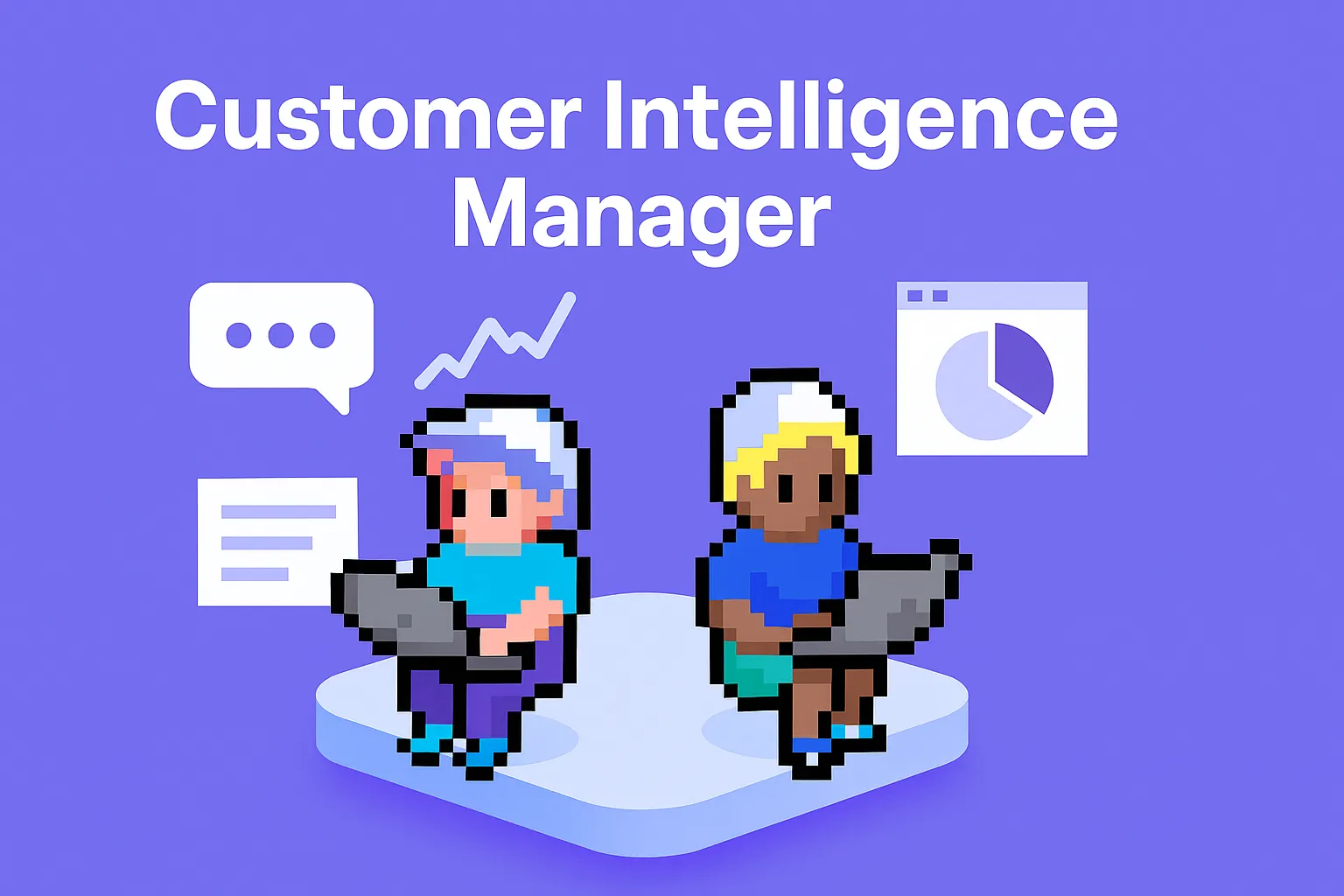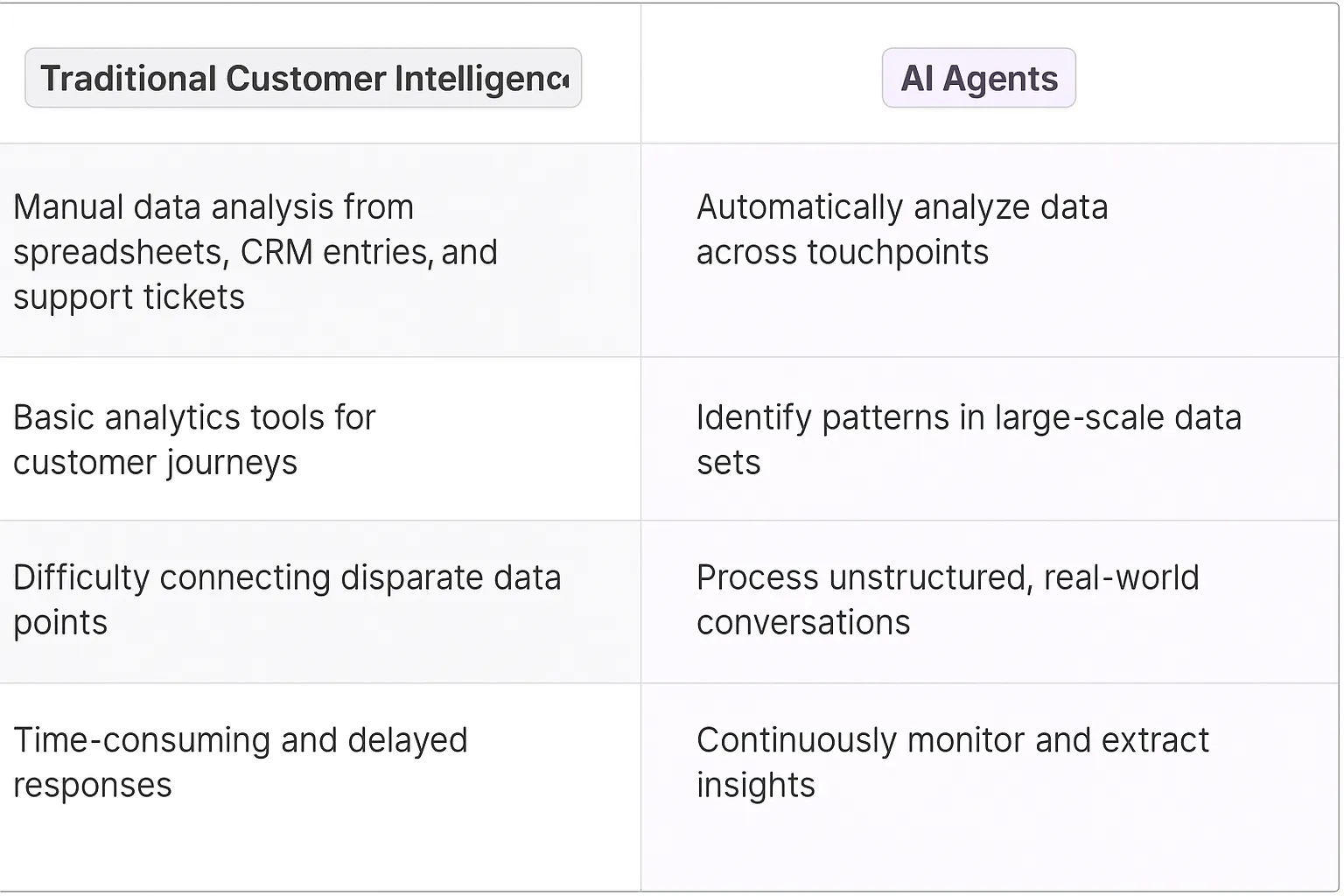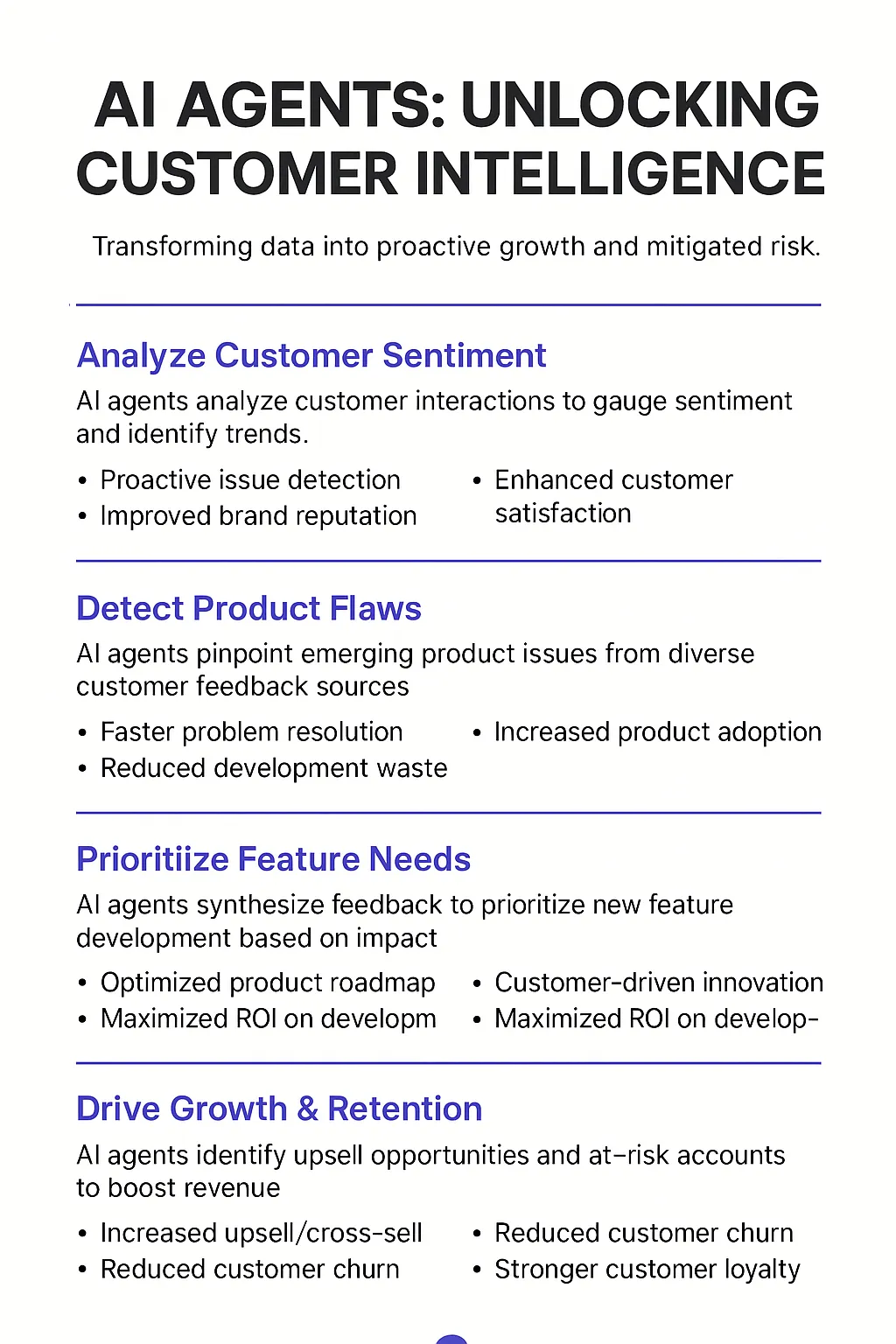Customer Intelligence Manager is a sophisticated AI-powered system that transforms raw customer data into strategic insights. Unlike traditional analytics tools, it operates continuously across multiple channels, processing both structured and unstructured data to identify patterns, predict trends, and surface opportunities that drive business growth. The system works as a digital teammate, augmenting human capabilities by handling the heavy lifting of data analysis while surfacing the most relevant insights for decision-makers.

Traditional customer intelligence relied heavily on manual data analysis, with teams spending countless hours sifting through spreadsheets, CRM entries, and support tickets. Marketing analysts would piece together customer journeys through basic analytics tools, while product teams struggled to connect disparate data points into meaningful insights. The process was not only time-intensive but often resulted in delayed responses to emerging customer trends.
Companies typically employed large teams of business analysts who would create quarterly reports, run SQL queries, and maintain complex dashboard systems. These approaches, while functional, created significant lag time between data collection and actionable insights.
AI Agents transform customer intelligence by operating as digital teammates who continuously monitor, analyze, and extract insights from customer interactions across all touchpoints. They're particularly effective at identifying patterns that humans might miss, especially in large-scale data sets.
The real game-changer is their ability to process unstructured data - those messy, real-world customer conversations that contain golden insights. These digital teammates can analyze customer sentiment in real-time, flag emerging issues before they become widespread, and automatically categorize feedback into actionable themes.
A key benefit is the shift from reactive to proactive customer intelligence. Instead of waiting for quarterly reports, teams receive immediate alerts about significant changes in customer behavior or sentiment. This rapid feedback loop enables product teams to iterate faster and marketing teams to adjust campaigns in real-time based on actual customer responses.
The network effects are particularly interesting here - as these AI Agents process more customer data, they become increasingly accurate at predicting customer needs and identifying opportunities for growth. They can spot subtle correlations between customer behaviors and outcomes, enabling teams to make data-driven decisions with higher confidence.
For growth teams, these AI Agents effectively create a continuous customer feedback system that scales automatically with your user base. They're particularly valuable for companies experiencing rapid growth, where manual analysis would create significant operational bottlenecks.

The most successful SaaS companies I've worked with treat customer intelligence like a strategic weapon. When you deploy AI agents to handle customer intelligence, you're essentially creating a 24/7 insights engine that processes millions of micro-signals about your customers' behaviors, needs, and pain points.
What's particularly fascinating is how these AI agents can identify patterns that human analysts might miss. For example, one B2B software company discovered that customers who engaged with their help documentation in a specific sequence were 3x more likely to upgrade to enterprise plans. This insight came from AI analysis of millions of user journeys - something that would have taken months to uncover manually.
The real power move is combining customer intelligence AI with rapid experimentation. When you can quickly test hypotheses generated by AI insights, you create a flywheel effect that continuously improves your product-market fit. I've seen teams reduce their time-to-insight from weeks to hours, leading to much faster iteration cycles on product development and customer success strategies.
The companies winning with customer intelligence AI aren't just collecting more data - they're building better feedback loops. Every customer interaction becomes a learning opportunity, feeding back into increasingly sophisticated models that predict customer needs before they even arise.

The versatility of Customer Intelligence Manager AI agents creates tangible value across multiple sectors. These digital teammates analyze customer behavior patterns, interpret market signals, and deliver actionable insights that drive strategic decisions. Let me break down some fascinating real-world applications I've seen while working with growth teams and founders.
When we look at how companies deploy these AI agents, we see a clear pattern: they're not just processing data - they're uncovering hidden customer narratives and behavior loops that traditional analytics often miss. The key differentiator is their ability to connect disparate data points into coherent customer stories, much like how the best product managers piece together user feedback to shape product direction.
What's particularly compelling is how these AI agents adapt their analysis based on industry context. They understand that customer behavior in B2B SaaS differs fundamentally from retail or healthcare, and they adjust their insights accordingly. This contextual awareness transforms raw data into industry-specific intelligence that teams can actually use to make better decisions.
A major sporting goods retailer deployed a Customer Intelligence Manager AI agent to decode their mountain of unstructured customer feedback. Rather than letting valuable insights gather dust in support tickets and social mentions, the AI agent continuously processes this data to surface actionable patterns.
The agent identified that customers frequently mentioned difficulty finding the right shoe size across different brands - Nike running shoes fit differently than Adidas training shoes, leading to returns and frustration. Armed with this insight, the retailer added a smart size comparison tool to their mobile app and trained store staff on brand-specific sizing nuances.
Beyond reactive fixes, the AI agent proactively spots emerging customer needs by analyzing search patterns and abandoned cart data. When it detected growing interest in sustainable athletic wear, it flagged this trend months before competitors, giving the merchandising team time to expand their eco-friendly product lines.
The most fascinating aspect is how the agent connects seemingly unrelated data points. It noticed that customers who bought premium running shoes often searched for training plans within 48 hours. This led to a successful partnership with a running app, offering free training programs with high-end shoe purchases - driving both customer satisfaction and average order value.
What makes this use case compelling is how it transforms scattered customer signals into a coherent strategy. The AI agent isn't just collecting data - it's finding the hidden relationships between customer behavior, product performance, and business outcomes. For retail businesses, this level of customer intelligence creates a compound effect: better inventory decisions, more relevant marketing, and stronger customer loyalty.
A regional healthcare network implemented a Customer Intelligence Manager AI agent to decode the complex web of patient feedback across their 12 hospitals and 50+ clinics. The fascinating part isn't just the scale - it's how the AI agent uncovered subtle patterns in patient satisfaction that traditional analytics missed completely.
The agent analyzed unstructured data from post-visit surveys, social media, and call center transcripts, revealing that patients who reported positive outcomes often mentioned their doctor's ability to explain complex medical terms in simple language. This insight led to the development of a communication training program for medical staff, focusing on accessible explanations of diagnoses and treatments.
One of the most powerful discoveries came from correlating appointment scheduling data with patient feedback. The AI agent identified that patients who waited more than 20 minutes past their appointment time were 3x more likely to switch healthcare providers - regardless of the actual care quality. The network responded by implementing a real-time waiting room updates system and adjusting scheduling algorithms.
The agent's pattern recognition capabilities proved particularly valuable in preventive care. By analyzing patient message threads and appointment histories, it identified that patients who missed routine screenings often cited scheduling conflicts with work hours. This led to the expansion of evening and weekend screening appointments, resulting in a 40% increase in preventive care compliance.
What makes this case study particularly compelling is how it bridges the gap between qualitative patient experiences and quantitative healthcare outcomes. The AI agent isn't just processing feedback - it's connecting dots between patient communication preferences, operational efficiency, and clinical success rates. For healthcare organizations, this intelligence creates a virtuous cycle of improved patient satisfaction, better health outcomes, and stronger patient retention.
Building an effective Customer Intelligence Manager AI agent requires navigating several complex technical hurdles. Data integration stands out as a primary challenge - your agent needs to seamlessly connect with CRM systems, support tickets, social media feeds, and internal databases. Many organizations struggle with data silos and inconsistent formatting across these sources, which can limit the agent's effectiveness.
The machine learning models powering these agents need extensive training on industry-specific customer interaction patterns. Without proper training data, agents may misinterpret customer sentiment or fail to identify critical trends. We've seen companies spend 6-12 months just cleaning and structuring their historical customer data before deployment.
The human side of implementation often proves more challenging than the technical aspects. Customer service teams may feel threatened by AI capabilities, leading to resistance or reduced adoption. Creating clear guidelines around when the agent should escalate to human team members becomes crucial - too much automation can damage customer relationships, while too little defeats the purpose.
Privacy and compliance requirements add another layer of complexity. The agent must balance detailed customer insights with data protection regulations like GDPR and CCPA. Organizations need robust governance frameworks to ensure the agent doesn't inadvertently expose sensitive information or cross ethical boundaries when analyzing customer behavior.
Existing workflow disruption presents a significant hurdle. Customer service teams have established processes, and introducing an AI agent requires careful change management. The agent needs to complement rather than replace human expertise, which means redesigning workflows and establishing new metrics for success.
Many organizations underestimate the ongoing maintenance required. Customer behavior patterns evolve, market conditions shift, and the agent's models need regular retraining to maintain accuracy. Building an internal team with the right skills to monitor and optimize the agent's performance becomes essential for long-term success.
The adoption of AI Agents in customer intelligence marks a fundamental shift in how businesses understand and serve their customers. These digital teammates don't just process more data - they uncover the subtle patterns and hidden opportunities that drive real growth. The most successful implementations create a virtuous cycle where better insights lead to better decisions, which in turn generate more valuable data for the AI to analyze.
The network effects of this technology are particularly powerful - as these systems process more interactions, their predictive capabilities become increasingly sophisticated. Organizations that successfully integrate these AI Agents into their operations gain a significant competitive advantage through deeper customer understanding and faster response to market changes.
Looking ahead, the companies that will win are those that view AI Agents not as replacements for human insight, but as powerful tools that amplify human decision-making capabilities. The future of customer intelligence lies in this harmonious combination of AI-powered analysis and human strategic thinking.